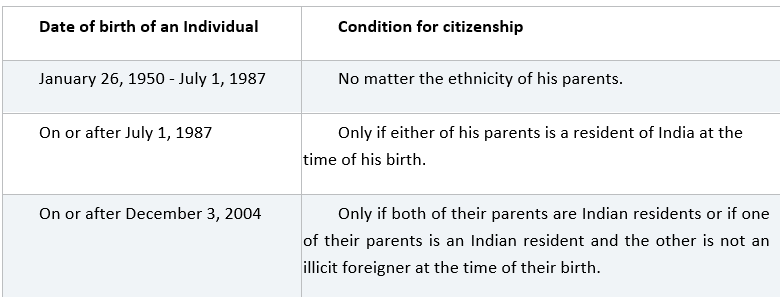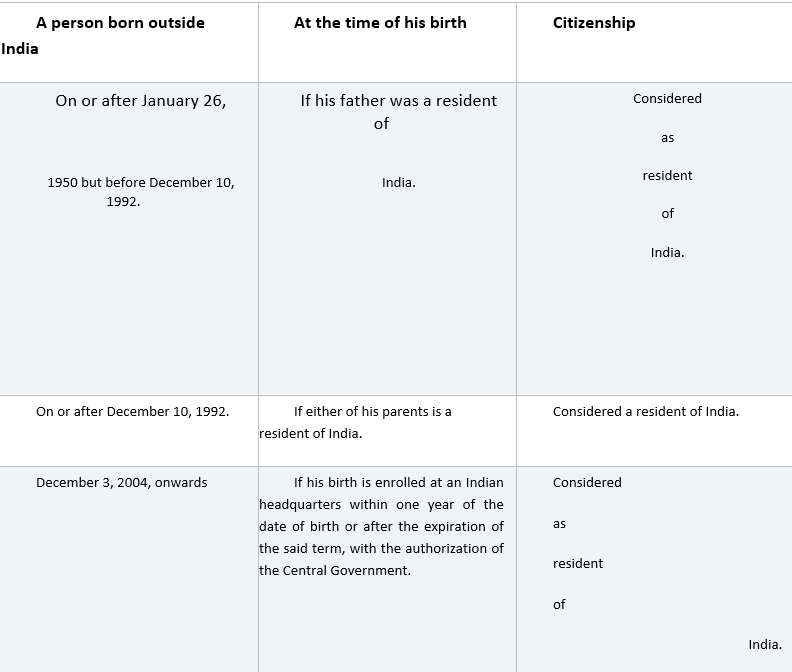Like every other modern Nation, India has two classifications of an individual: foreigners and citizens.
- Citizens are permanent members of the Indian state and swear loyalty towards their Nation, they are granted the political and civil rights of the Indian state
- Non-citizens, on the other hand, are permanent members of another Nation, thus doesn’t enjoy the benefits of political rights and civil rights of the Indian state
Rights to the citizens of India by the Constitution:
Under citizenship in India, citizens enjoy fundamental rights under article 12-35 part 3 of the Constitution of India. The six fundamental rights are as follows:
- Under articles 14 to 18, the right to equality for the opportunity regarding the matter of public employment.
- Under articles 19 to 22, citizens enjoy the right to freedom of expression, assembly, movement, speech, profession, and residence.
- Under articles 23 and 24, the right against exploitation.
- Under articles 25 to 28, the right to freedom of religion.
- Under articles 29 and 30, the educational and cultural rights.
- Under articles 32 and 226, Constitutional remedies rights.
Citizenship in India: Articles 5 to 11 under Part II of the Constitution
- Articles 5 to 11 under Part II in the constitution deals with the provision of Citizenship in India, however, it contains neither any permanent nor any intricate provisions, i.e., Citizenship in India
It only acknowledges the individuals who became residents of India at its commencement (i.e., on January 26, 1950)
- It does not handle the problem of acquiring or loss of Citizenship in India after its commencement
- It gives Parliament the authority to approve laws dealing with these and other citizenship-related problems, as a result, Parliament approved the Citizenship Act 1955, which has been revised from time to time
The Citizenship Act 1955
Parliament passed a comprehensive law managing citizens in 1955 following the powers vested in it by Article 11 of the Constitution. The Act’s key provisions may be broadly divided into three parts: acquisition of citizenship, termination of citizenship, and supplemental provisions.
Acquisition of Citizenship:
The Citizenship Act 1955 prescribes six ways of acquiring citizenship in India, viz., birth, at the commencement of the constitution, descent, naturalization, registration, and incorporation of territory:
1. Citizenship in India By Birth-

Citizenship in India by descent:
- A petition for the registration of a minor child’s birth to an Indian bureau shall be looked after by an undertaking in writing from the parents of such minor child that they do not hold the passport of any other nation
- Additionally, a minor who is a resident of India under descent and is also a resident of any other nation shall end up being an inhabitant of India if he does not refuse the citizenship or ethnicity of another country within six months of his achieving full age
- Citizenship in India by Registration:
Any person who is not already an Indian resident under the terms of the Constitution or those of this Act can attain citizenship by registration if that individual belongs to any one of the following five classifications:
- Individuals of Indian origin are usually resident in India for seven years, shortly before making a petition for registration
- Individuals of Indian origin are usually residents in any nation or habitat outside undivided India
- An individual who is or has been married to an Indian citizen
- Minor children of individuals who are Indian citizens
- Naturalization:
On the petition, the Central Government may grant a certificate of naturalization to any individual (who is not an illegal migrant) who meets the following requirements:
- That he is not a subject or resident of any nation where naturalization prevents Indian people from being subjects or residents of that nation
- That, if he is a resident of any nation, he agrees to relinquish the citizenship of that nation in the event his application for Indian citizenship is accepted
- That he is of a decent personality
- That he has a proper authority of one of the languages cited in the Constitution’s Eighth Schedule
- When a certificate of naturalization is offered to him, he proposes to live in India or to go into or continue in employment under a Government in India or under an international institution of which India is a member or under a society, firm, or body of individuals set up in India
- The Government of India may ignore all or any of the above conditions for naturalization in the case of a person who has provided distinguished service to philosophy, literature, art, world peace, science, or human progress
- Every naturalized resident should take an oath of patriotism to the Constitution of India
- By Incorporation of Territory:
If a foreign province becomes a part of India, the Indian government specifies the individuals who will become Indian residents among the territory’s inhabitants. From the notified date, such individuals become Indian people. For example, after Pondicherry was made a part of India, the Citizenship (Pondicherry) Order (1962) was issued by the Indian government under the Citizenship Act 1955.
Loss of Citizenship:
The Citizenship Act 1955 proposes three ways to lose citizenship, regardless of whether it was obtained under the Citizenship Act or before it under the laws. Termination, Renunciation, and Deprivation:
- By Renunciation:
- Any overseas citizen of India of full age, i.e., 18 and ability, can state a statement renouncing his Citizenship of India, that person discontinues being an Indian resident once that statement is mentioned
- But if that statement is made during a battle in which India is implicated, the Federation will keep the registration pending
- When a male person refuses his citizenship of India, their minor kids lose their Indian citizenship, but they can attain Indian citizenship within a year of their acquiring age.
- By Termination:
- As an Indian resident voluntarily (consciously, deliberately, and without tension, disproportionate impact, or compulsion) obtains the citizenship of another nation, his Indian citizenship automatically terminates
- However, This prerequisite does not relate to a war in which India is immersed
By Deprivation:
It is a mandatory termination of citizenship of India by the Federation, if:
- The resident has attained citizenship by conspiracy
- The resident has demonstrated infidelity to the Indian Constitution
- The resident has been illegally marketed or transmitted with the foe during a war
- The resident has been detained for two years in any nation within five years of enrollment or naturalization
- The resident has been an ordinary citizen outside of India for seven years consistently
Single Citizenship
- The Constitution of India proposes only single citizenship, I.e., Indian citizenship. Dual CItizenship in India is not permitted. The residents in India owe an obligation just to the Union. There is no independent state citizenship. But some countries like Switzerland etc., have dual citizenship.
- As in Canada, the Constitution of India has initiated the single citizenship System and grants uniform rights (except in a few cases) for the people of India to promote the feeling of brotherhood and harmony among them and formulate an integrated Indian country.
- In India, regardless of where they were born or where they reside, all people have the same political and civil rights as other residents throughout the nation, and there is no discrimination among them.
Conclusion
Citizens are permanent members of the Indian state and swear loyalty towards their Nation. They are granted the political and civil rights of the Indian state.Under citizenship in India,citizens enjoy six fundamental rights under article 12-35 part 3 of the Constitution of India. The Citizenship Act key provisions may be broadly divided into three parts: acquisition of citizenship, termination of citizenship, and supplemental provisions.The Citizenship Act 1955 proposes three ways to lose citizenship, regardless of whether it was obtained under the Citizenship Act or before it under the laws. Termination, Renunciation, and Deprivation.The Constitution of India proposes only single citizenship, I.e., Indian citizenship. Dual CItizenship in India is not permitted.
 Profile
Profile Settings
Settings Refer your friends
Refer your friends Sign out
Sign out










